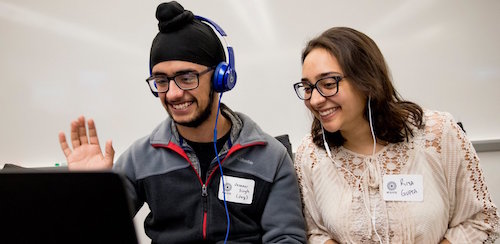
University of Michigan students chat during an M2GATE virtual exchange session.
A Washington, D.C. forum on the positive impacts virtual exchange programs can have on communities and young people worldwide included a panel discussion featuring Amy Gillett, vice president of WDI’s Education initiative.
The forum, “Inspiriting Civic Engagement through Virtual Exchange,” was sponsored by the Stevens Initiative and hosted by the Aspen Institute. It was held May 17-18. The panel discussion is featured below and begins at the 1:23:10 mark.
Gillett discussed WDI’s work this year with the Stevens Initiative on the MENA-Michigan Initiative for Global Action Through Entrepreneurship (M²GATE) program. For the first two cohorts, WDI recruited 111 students from three Michigan universities ― University of Michigan, Wayne State University and Eastern Michigan University ― and 223 of their peers from the participating Middle East and North Africa (MENA) region countries of Egypt, Libya, Morocco and Tunisia. The third and final cohort began May 25 with 60 Michigan students and 151 MENA students enrolled.
For the project, the Michigan-based students were paired with their Middle East counterparts to find entrepreneurial solutions to social challenges in the MENA region. Working virtually, teams of six developed social entrepreneurship projects and accompanying pitches over an eight-week period. Guiding them along the way were instructors, mentors, and successful entrepreneurs from MENA and Michigan. The teams coordinated times for virtual group work and produced a pitch video as a final assignment.
Gillett was joined on the panel by Jennifer Chen of World Learning and Victor Eno of Florida A&M University, leaders at two other organizations that also implemented virtual exchange programs in partnership with the Stevens Initiative. The three discussed why it is important for young people to be active participants in their communities, what they can learn about civic engagement from their global peers and how virtual exchange programs can advance participation.
“This program fundamentally changes participants’ point of view on their role in society by helping them realize that they can be the ones to address issues in society instead of waiting for the government or some other entity to take action, Gillett said. “Some of our participants are starting to refer to themselves as ‘changemakers’ and I think that’s an apt description.”
The Stevens Initiative is an international effort to build global competence and career readiness skills for young people in the United States, the Middle East and North Africa; it is funded by several public and private donors including the U.S. Department of State and the Bezos Family Foundation.
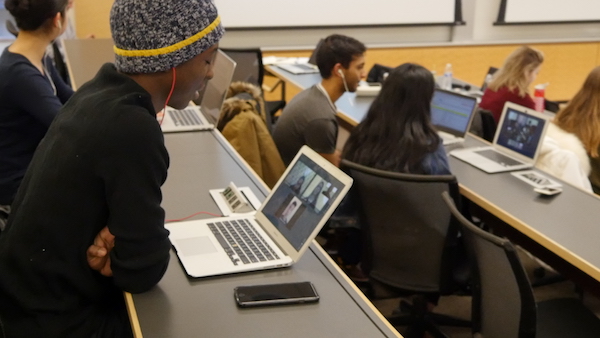
Students gather at U-M’s Ross School of Business for the launch of the M²GATE program.
Brett Ritter admitted to feeling a bit nervous at the kickoff event for WDI’s new M²GATE program where he would meet his international teammates for the first time. He worried that cultural differences and a language barrier might hinder his ability to work with his peers from the Middle East and North Africa.
“There were a lot of unknowns that made me a little worried if this program was right for me,” the freshman finance major at the Ross School of Business said. “But I was given great guidance by our leaders as to what the program was all about. The mentors made me excited to go forward working with my team. I also enjoyed meeting my team for the first time.”
“We learned a lot about each other in such a short period and it really opened my eyes.”
Ritter is one of 53 U-M students participating in the first cohort of the MENA-Michigan Initiative for Global Action Through Entrepreneurship (M²GATE) program. He and his fellow Wolverines are paired with 112 undergrads from top universities in Egypt, Libya, Morocco and Tunisia to find entrepreneurial solutions to social challenges in the Middle East and North Africa (MENA) region. (Applications are being accepted through March 1 for the second and third cohorts for the program, which is open to undergraduates from Eastern Michigan University and Wayne State University along with all three U-M campuses.)
For the first cohort, the 165 total students were placed on 28 teams of five to six students each. Working virtually, teams will develop social entrepreneurship projects and accompanying pitches over an eight-week period. Guiding them along the way are instructors, mentors, and successful entrepreneurs from MENA and Michigan. The teams coordinate times for virtual group work and produce a pitch video as a final assignment.
Claudia Cornejo, a sophomore at Ross studying business administration, couldn’t wait to attend the Jan. 26 program kickoff. She was excited to meet the students she would work with, understand their perspectives on the program and why they are interested in social impact. After meeting her teammates from Morocco, she said she was fascinated by the idea that although they grew up in different worlds, all were aware of social challenges within their own communities and were motivated to join a program that addressed them.
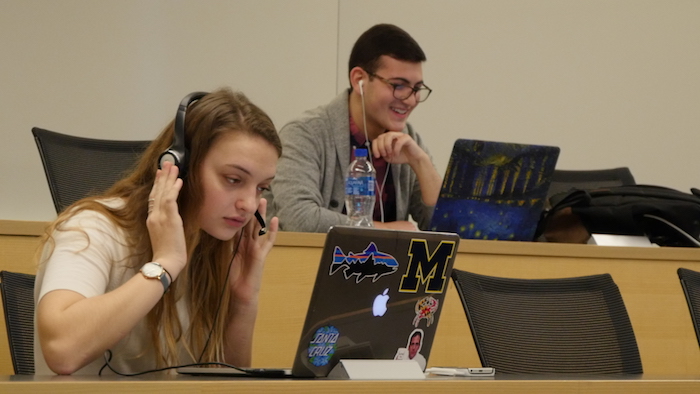
“It was incredible to see just how similar our personalities and perspectives were, even though our upbringings and environments are so distinct,” Cornejo said.
At the program kickoff, participants from the four MENA countries were beamed via video chat into a Ross School of Business classroom where the U-M students were seated. After introductions, the students worked on a team-building exercise before coming back together to report on what they learned. Program organizers then walked the teams through the eight-week schedule and where to go for resources.
Cornejo said she is interested in education policy in the U.S. and around the world, and believes entrepreneurship could be an untraditional approach to help solve challenges.
“This program took my interests to the next level by allowing me to work one-on-one with people from different parts of the world,” she said. “I have come across many different programs and organizations that do work internationally but never give you this unique personal relationship with fellow students around the world. M²GATE provides the perfect platform that connects me to students with the same passions and goals as me, but with different perspectives, worldviews and approaches to try and achieve these goals.”
Ritter said he is currently working on a social entrepreneurship project independently and thought M²GATE would help him learn more. He also wanted to connect with people from other cultures.
“This is a once-in-a-lifetime experience where we could have mentors help us help the world,” Ritter said. “What I found appealing about the project was that it teaches team building and valuable communication skills that are essential for any aspiring businessman.”
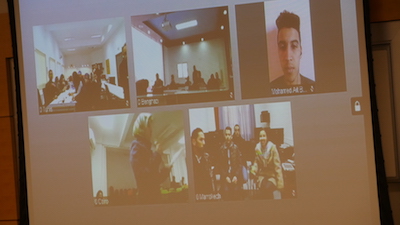 Adrian Maloy, a second-year student majoring in accounting and finance at UM-Dearborn, was teamed with some students in Tunisia. He said the M²GATE program was appealing because it exposes him to a different culture.
Adrian Maloy, a second-year student majoring in accounting and finance at UM-Dearborn, was teamed with some students in Tunisia. He said the M²GATE program was appealing because it exposes him to a different culture.
“Our world is becoming smaller, and taking the opportunity to gain global competencies will become a companion in how people develop socially,” Maloy said. “I feel this program allows you to gain those competencies.”
Cornejo and Ritter also see the program as a possible stepping stone to studying abroad and maybe a career overseas.
“I have always seen my career path taking me abroad, however this will be my first experience communicating across different cultures to try and ameliorate a social issue affecting many people around the world,” Cornejo said. “I want to learn how other cultures approach issues such as education reform, and how we can translate and combine our ideas to create an even better solution than just one community or culture could come up with.
“I am a firm believer that analyzing different perspectives and cultures can lead you to a more comprehensive solution to any problem.”
Ritter said he hopes the program gives him some guidance on “what my purpose is on helping society.”
“We all need to do our part, and I hope this program can make me realize what that part is,” he said, adding that it might be spending a semester or more studying overseas.
“Studying abroad is one of the greatest experiences I can get,” he said. “It’s college. I want to live it to the fullest, however I can.”
Applications for M2GATE are being accepted through March 1 here.
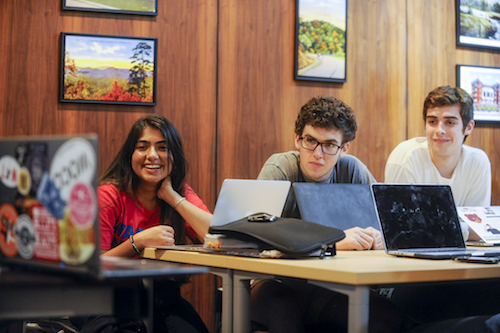
Students at Wofford College conduct a virtual exchange discussion in a program to increase cross-cultural understanding funded by the Stevens Initiative in 2016. (Image credit: Mark Olenckim/Stevens Wofford College.)
As the first cohort of Michigan students begin collaborating online with their peers in four North African countries, WDI is seeking interested undergraduate students at Eastern Michigan University, all three campuses of the University of Michigan and Wayne State University to join the next two groups of participants for this unique international opportunity.
The program, the MENA-Michigan Initiative for Global Action Through Entrepreneurship (M2GATE), pairs undergrads from the three Michigan universities with those in Egypt, Libya, Morocco and Tunisia to find entrepreneurial solutions to social challenges in the Middle East and North Africa (MENA) region. It also increases cross-cultural understanding and equips young people with the skills needed to thrive in a 21st century economy.
Working virtually, teams will develop social entrepreneurship projects and accompanying pitches over an eight-week period with the help of instructors, mentors, and successful entrepreneurs from MENA and Michigan. Each cohort of approximately 128 international students and 64 Michigan-based students will culminate in a virtual competition.
The teams comprised of students from Michigan universities and students from Egypt, Libya, Morocco and Tunisia will coordinate times for virtual group work and produce a pitch video as a final assignment. In all, students will spend about 32 hours on the program. The second cohort is scheduled to run from early April to early June; the third cohort will be from early May to mid-July.
Judges will look for scalable solutions that feature science, technology, engineering, and math – or STEM-based – innovations. The MENA students from the winning teams will have the chance to travel to Michigan to interact with entrepreneurs in Ann Arbor and Detroit, and, as a team, pitch their projects to an expert panel for feedback and further development.
The partner organizations in M²GATE include Benghazi Youth for Technology & Entrepreneurship (BYTE) in Libya, Al Akhawayn University in Morocco, and Tunis Business School at the University of Tunis in Tunisia.
Michigan college students selected for the program will attend an orientation meeting as well as debrief and wrap-up sessions at the end of the eight weeks. They will be invited to watch lectures and interactive discussions on WDI’s ExtendEd learning portal on six topics: cross-cultural team building; communication skills; leadership development; design thinking and creative inquiry; introduction to entrepreneurship; and, creating a business model canvas.
WDI was one of 13 organizations chosen for the second round of the 18-month program, which is funded by the Stevens Initiative, an international effort to build career and global competence skills for young people in the U.S. and MENA region. The Initiative honors the legacy of U.S. Ambassador Chris Stevens, who devoted his life to building bridges between people from different cultures.
“After the Arab Spring in 2010, young people in this region increasingly turned to social entrepreneurship to address the challenges in their societies,” said Amy Gillett, vice president of WDI’s Education Initiative. “Given the state of these economies and the upsurge of entrepreneurial interest, this program comes at an ideal time.”
The co-curricular program will equip students with skills in entrepreneurship, team building, innovation and design thinking, international business, problem solving and critical thinking.
“This is a wonderful opportunity for students to work cross-culturally, forge new international connections, and gain exactly the type of 21st century skills needed to succeed in today’s global economy,” Gillett said.
Interested undergraduate students from EMU, U-M and WSU can learn more about M²GATE at the program website. They may also attend an upcoming screening of the film “Extreme by Design,” at 4-6 p.m. Feb. 1 in Room R0210 at the Ross School of Business. WDI is co-hosting a screening of the documentary, which features college students introducing innovative products in emerging markets by applying design thinking and entrepreneurship principles. The showing will followed by a panel discussion and a reception. Space is limited, so students are encouraged to register here.
Housed at the Aspen Institute, the Stevens Initiative is a collaboration between the family of Ambassador J. Christopher Stevens, the U.S. Department of State, the Bezos Family Foundation, the governments of the United Arab Emirates and Morocco, and Microsoft, Twitter, Vidyo, and LRNG.
For more details and to apply to M²GATE, click here.
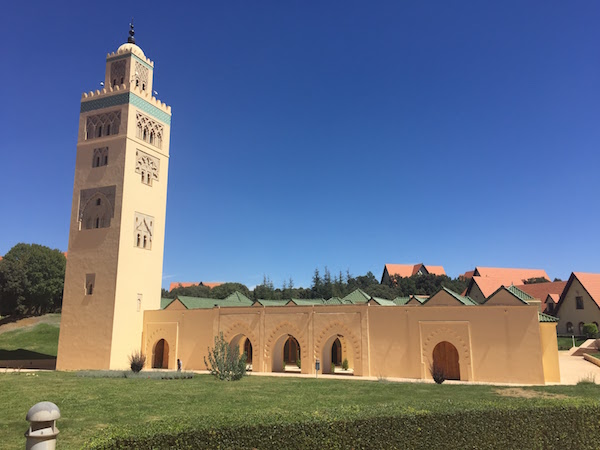
Al Akhawayn University in Morocco, one of the organizations participating in the M2GATE project. (Image by Meghan Neuhaus/WDI)
WDI has been selected by the Stevens Initiative to run an exciting program that uses online, collaborative learning to connect University of Michigan undergraduate students with their peers in four North African nations to find entrepreneurial solutions to social challenges in the region, while also increasing cross-cultural understanding and equipping young people with the skills needed to thrive in a 21st century economy.
Through a virtual exchange, U-M students at the Ann Arbor, Flint and Dearborn campuses will be teamed with fellow students in Egypt, Libya, Morocco, and Tunisia. Together, the teams will develop and launch social entrepreneurship projects with the help of instructors, mentors, and successful entrepreneurs from Michigan and the Middle East and North Africa (MENA) region.
WDI was one of 13 organizations chosen for the second cohort of the 18-month program, which is funded by the Stevens Initiative, an international effort to build career and global competence skills for young people in the U.S. and MENA region by growing and enhancing the field of virtual exchange. The Initiative honors the legacy of U.S. Ambassador Chris Stevens, who devoted his life to building bridges between people from different cultures.
The program, the MENA-Michigan Initiative for Global Action Through Entrepreneurship (M2GATE), will support three, eight-week cohorts, with the first beginning in January. Each cohort of 128 MENA students and 64 U-M students will culminate in a virtual competition. Judges will look for scalable solutions that feature science, technology, engineering, and math – or STEM-based – innovations. The MENA students from the winning teams will have the chance to travel to Michigan to interact with entrepreneurs in Ann Arbor and Detroit, and as a team pitch their projects to an expert panel for feedback and further development.
U-M students selected for the program will attend an orientation meeting as well as debrief and wrap-up sessions at the end of the eight weeks. They will be invited to watch lectures and interactive discussions on WDI’s ExtendEd learning portal on six topics: cross-cultural team building; communication skills; leadership development; introduction to entrepreneurship; design thinking and creative inquiry; and, creating a business model canvas.
The teams comprised of students from U-M and students from Egypt, Libya, Morocco, and Tunisia will coordinate times for virtual group work and produce a pitch video as a final assignment. In all, students will spend about 32 hours on the program over the eight-week time period.
The new programs at U-M and the other grantee organizations will expand the Initiative’s reach to 30,000 students in 18 countries in the Middle East and North Africa and 31 U.S. states. Examples of other programs in the second cohort include one that uses virtual exchange to improve global citizenship and problem-solving skills among hospitality students in the U.S. and Jordan, and an engineering program addressing common environmental and public policy challenges through collaboration between students in Arizona and the Palestinian Territories. The other Stevens Initiative grantees announced today are:
“With the support of the Stevens Initiative, young people from the United States, the Middle East, and North Africa are connecting and learning together – gaining important skills while learning about global cultures,” said Elliot Gerson, executive vice president of Policy and Public Programs of the Aspen Institute. “We look forward to working with the William Davidson Institute at the University of Michigan to scale the Initiative to Ann Arbor and Dearborn.”
“After the Arab Spring in 2010, young people in this region increasingly turned to social entrepreneurship to address the challenges in their societies,” said Amy Gillett, vice president of WDI’s Education Initiative. “Given the state of these economies and the upsurge of entrepreneurial interest, this program comes at an ideal time.”
The unique co-curricular program will equip students with skills in entrepreneurship, team building, innovation and design thinking, cross-cultural communication, international business, problem solving, and critical thinking.
“This is a wonderful opportunity for students to work cross-culturally, forge new international connections, and gain exactly the type of 21st century skills needed to succeed in today’s global economy,” said Gillett.
Housed at the Aspen Institute, The Stevens Initiative is a collaboration between the family of Ambassador J. Christopher Stevens, the U.S. Department of State, the Bezos Family Foundation, the governments of the United Arab Emirates and Morocco, and Microsoft, Twitter, Vidyo, and LRNG.
For more details and to apply, click here.


The William Davidson Institute at the University of Michigan is running an exciting new program that pairs University of Michigan undergraduate students with their peers in four North African nations to find entrepreneurial solutions to social challenges in the region.
Through the virtual exchange, U-M students at the Ann Arbor and Dearborn campuses will be teamed with fellow students in Egypt, Libya, Morocco, and Tunisia. Together, the teams will develop and launch social entrepreneurship projects with the help of instructors, mentors, and successful entrepreneurs from Michigan and the Middle East and North Africa (MENA) region.
“After the Arab Spring in 2010, young people in this region increasingly turned to social entrepreneurship to address the challenges in their societies. Given the state of these economies and the upsurge of entrepreneurial interest, this program comes at an ideal time,” said Amy Gillett, vice president of WDI’s Education Initiative.
The unique co-curricular program will equip students with skills in entrepreneurship, team building, innovation and design thinking, cross-cultural communication, international business, problem solving, and critical thinking.
“This is a wonderful opportunity for students to work cross-culturally, forge new international connections, and gain exactly the type of 21st century skills needed to succeed in today’s global economy,” said Gillett.
The program, the MENA-Michigan Initiative for Global Action Through Entrepreneurship (M2GATE), will support three, eight-week cohorts, with the first beginning in January 2018. Each cohort of 128 MENA students and 64 U-M students will culminate in a virtual competition. Judges will look for scalable solutions that feature science, technology, engineering, and math – or STEM-based – innovations. The winners will have the chance to travel to Michigan to interact with entrepreneurs in Ann Arbor and Detroit, and pitch their projects to an expert panel for feedback and further development.
An informational session will be held on the Dearborn campus at 3 p.m. on Nov. 13 at the Talent Gateway Commons, Suite 285 Fairlane Center North (FNC).
U-M students selected for the program will attend an orientation meeting as well as a debrief and wrap-up session at the end of the eight weeks. They will be invited to watch lectures and participate in interactive discussions on WDI’s ExtendEd Learning Portal on six topics. They are: cross-cultural team building; communication skills; leadership development; introduction to entrepreneurship; design thinking and creative inquiry; and, creating a business model canvas.
The teams comprised of students from U-M and partner institutions in Egypt, Libya, Morocco, and Tunisia will coordinate times for virtual group work and produce a pitch video as a final assignment. In all, students can expect to spend about 32 hours on the program over the eight-week time period.
Through the Economic Development Initiative under The U.S.-Middle East Partnership Initiative (MEPI), WDI partnered with Al Akhawayn University of Ifrane, Morocco, to provide business training to 60 Moroccan entrepreneurs from 2004 to 2006. The goal of the project was to strengthen skills among entrepreneurs and business people working for small- and medium-sized enterprises in Morocco through targeted training of business managers and direct consulting at the firm level in the areas of handicraft, tourism, electronics, agribusiness, offshoring, and textiles.
The overall objective was to help entrepreneurs in Morocco benefit from its recently concluded Free Trade Agreement (FTA) with the United States and provide Moroccan firms with the tools needed to grow into more competitive companies. By equipping the owners of 60 small businesses with management skills in key areas and encouraging participants to share their learning with their employees, the training was projected to impact up to 1,800 people in small businesses throughout Morocco.
The project included a Small Business Training Component (featuring workshops at Al Akhawayn University), a 7-week student consulting project, and three 14-week summer consulting projects featuring students from the University of Michigan Ross School of Business. The consultant teams presented their findings to the clients and to the US Ambassador in Rabat and received appreciation for their concrete business solutions.
In January, two members of WDI’s new Entrepreneurship Development Center, part of the Institute’s Education Initiative, traveled to Bahrain to work with Tamkeen, a government-affiliated organization in Bahrain tasked with developing the country’s private sector.

Millie Chu, Diana Paez-Cook and Kristin Babbie stand in front of the Bahrain Chamber of Commerce and Industry Building.
“We collaborated with the team at Tamkeen to put together a results-based monitoring and evaluation framework focused on developing objectives, outcomes, outputs and indicators for their new Entrepreneurship Mentoring program,” said WDI’s Kristin Babbie. “They wanted to be able to articulate the results of the mentoring program on the entrepreneurs who participated and demonstrate its impact.”
Since 2014, WDI, in partnership with the Center for International Private Enterprise (CIPE), has helped develop entrepreneurship training and mentorship programs in Bahrain.
Babbie and WDI’s Diana Paez-Cook spent one week in Bahrain, an island nation in the Persian Gulf. Paez-Cook said WDI also worked with the Entrepreneurship Mentoring team at Tamkeen to ensure it fit their needs.
“They are now able to populate the framework and use it as a management tool for their program, as well as adapt it to their evolving needs,” said Paez-Cook, who also is director of WDI’s Grants Management team.
She and Babbie, who also is a senior project administrator on the Grants Management team, will guide Tamkeen in the M&E process over the first year of the Entrepreneurship Mentor program. The program is scheduled to launch this spring.
“We will provide support when requested in terms of entrepreneurship indicators related to mentoring, as well as guidance in terms of data collection tools and approaches that they might require,” Paez-Cook said.
During their recent trip to Bahrain, Paez-Cook and Babbie also discussed developing a coaching program with Tamkeen’s Coaching Team. While a typical mentoring engagement lasts 9-12 months or longer, a coaching relationship would target a specific problem an entrepreneur has and would end once the problem is resolved.
Accompanying the two on the Bahrain trip was Millie Chu, a WDI consultant. Chu and the WDI team discussed with Tamkeen what a coaching program would look like, and what resources the Institute could provide. Paez-Cook said discussions with Tamkeen on a coaching program will continue.
WDI’s entrepreneurship training, mentorship training and capacity-building work in Bahrain are some of the WDI Education Initiative’s key focus areas, and builds on one of its areas of strength and expertise.
WDI’s original work in Bahrain, started three years ago, focused on entrepreneurship training. The government had begun several entrepreneurship initiatives unique to the region. But it became clear that the initiatives lacked qualified entrepreneurship instructors to deliver training programs.
To address the need for qualified trainers, Washington, D.C.-based CIPE asked WDI to develop an entrepreneurship instructor’s manual and leadership curriculum.
The training materials incorporate leadership, critical thinking, active citizenship, ethics, and decision-making techniques into the existing curricula. It is used in the training of Bahrain’s trainers, and subsequently by the trainers in their entrepreneurship education programs.
Julie Felker, a WDI faculty affiliate, wrote the leadership curriculum. She traveled to Bahrain in late 2014 to hold a workshop for trainers involved in Bahrain’s entrepreneurship initiatives and education programs to implement the training in conjunction with CIPE. Felker’s workshop included discussions on leading practices that were part of the newly developed materials and was tailored to address the needs of the Bahraini trainers.
Building on this collaboration, WDI sent Peter Scott, professor of entrepreneurship at the Whitman School of Management at Syracuse University and author of an entrepreneurial training guide, to Bahrain in March 2015. The guide provides skills, “how to” examples, and resources to teach entrepreneurship and make the process experiential, or real, for the student.
Also in March 2015, WDI Faculty Affiliate Matt Brown traveled to Bahrain to present a comprehensive entrepreneur mentoring guide he developed to help Tamkeen create a program specifically for the country’s entrepreneurs. Two months later, he returned to deliver a two-day “train the trainer” workshop for those interested in mentoring new and existing Bahraini entrepreneurs.
The Bahrain project also builds on WDI’s long track record of providing entrepreneurship education in emerging markets. For example, working with Goldman Sachs’ 10,000 Women project, WDI designed and delivered 12, six-month entrepreneurship programs at the College of Business and Economics at the University of Rwanda in Kigali. In all, more than 300 women graduated from the program, which included modules on “Introduction to Business Strategies,” “Marketing, Negotiations & Customer Care,” “Operating a Business in Rwanda,” “Budgeting & Management Accounting,” “Financial Management & Loans” and “Developing a Successful Business Plan.”
And the U.S. State Department’s Middle East Partnership Initiative awarded WDI a grant to provide training for entrepreneurs from throughout Morocco. The training consisted of sessions in marketing, strategy, accounting, finance and exporting. The grant was renewed the following year based on successful delivery. WDI partnered with Moroccan-based Al-Akhawayn University to offer a total of six training programs in Morocco.
The University of Michigan’s Ross School of Business recently celebrated 25 years of Multidisciplinary Action Projects (MAPs), an action-based learning course for first-year MBA students who receive guidance from faculty advisers. During that span, 10,438 full-time MBA students have worked on 2,010 projects in 92 countries with 1,352 sponsor companies. In recent years, executive, evening and weekend MBA students have participated in MAPs as well.

WDI began sponsoring international MAP projects for Ross in 1992, the year after they began, and have funded and provided faculty advisers for about 225 projects in the 24 years since. WDI President Paul Clyde said MAPs are “one of many tools available to pursue our mission” to develop knowledge and capability that improves the effectiveness of firms and social welfare in emerging economies.
“We’re using it in specific initiatives as a way of building relationships and developing solutions in the field with our partners,” he said. “For us, MAPs aren’t an isolated event, they are part of a longer-term relationship.”
WDI Senior Research Fellow Ted London said MAPs not only benefit students and sponsoring organizations, but also faculty members who advise the projects. It is a valuable way to keep in touch with multiple organizations, understand their latest successes and roadblocks, and think more broadly about solutions.
“I enjoy MAP so much, in part, because it gives me the opportunity to listen and learn,” said London, who also is vice president of WDI’s Scaling Impact Initiative. “These are often organizations we have worked with for many years and it’s great to have another reason for a frank and in-depth engagement.”
Each MAP project requires analytical rigor, critical thinking, and teamwork from the students. Teams of 4-6 students spend seven weeks exclusively working on their MAP projects, including 3-4 weeks in the field. Sponsors receive top-notch deliverables and data-driven recommendations from the team.
After learning about their projects and conducting research in the classroom for several weeks, the students then spend three to four weeks working alongside their project sponsors in the field.
Clyde, who served as an adviser to his first MAP team in 1998 while on the faculty at Ross, said the student projects are a “fun way to teach.”
“Something always comes up that’s an illustration of a point made in their core courses,” he said. “I distinctly remember times when you could see the lightbulb go off and they suddenly understood the concept because they were in that setting, they were living it in the field.”
WDI’s Education Initiative recently began deploying MAP teams to help further its mission of identifying and sharing new ways to enhance management education in emerging markets. This past winter, two MAP teams worked on entrepreneurship projects in Kosovo and Morocco, and one team examined e-learning at a major technical university in Georgia.
“MAP teams allow us to offer our education partners in-depth strategic guidance and for us to be able to consolidate learnings across projects and thereby identify needs, trends, and best practices in management education,” said Amy Gillett, vice president of the Education Initiative. “The projects we’ve sourced related to entrepreneurship education are helping us develop new models and tools to share with a global audience through WDI’s new Entrepreneurship Development Center for emerging markets.”
London, who has been a faculty adviser to about 50 student teams since joining WDI in 2004, called MAPs a “virtuous cycle” that benefits students, WDI’s partners, and the institute’s research.
MAPs embed students with an organization, whether it’s a nonprofit or a corporation, and apply what they have learned in school to help solve an issue the organization is facing.
“They’re solving real problems and understanding the context,” London said “They’re on the ground 3-5 weeks so they have a chance to get acclimated and then really get engaged.”
Clyde said MAPs also are an opportunity for students “to learn how to work in a team setting, to test out their leadership skills, and learn about other cultures.”
Benefitting Organizations, Influencing Students
Allie Schachter was a member of a MAP team that worked with a company interested in rolling out an active learning platform in an emerging market context. Managed by WDI’s Education Initiative, Schachter and her team embedded with the Stockholm School of Economics in Riga, Latvia. Schachter said she enjoyed applying what she had learned in the classroom to a real-world business problem. (Watch a video of Schachter talking about the MAP project below).
“My MAP experience solidified and contextualized many of the concepts discussed in class, which was an incomparable educational experience,” she said. “It was a great opportunity to work with a group on a very large and involved project. Throughout the course of our project, we honed our ability to work together, delegated tasks to one another, and navigated difficult conversations and challenges together.
“It was a really great opportunity to gain experience working for and with others. I will certainly carry those experiences forward when working with teams at work and in future classes.”
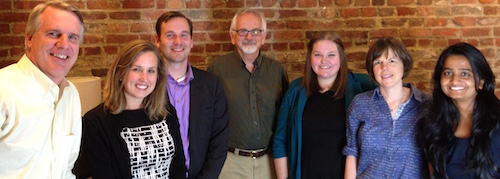
Perry Samson, center, poses with WDI President Paul Clyde, left, WDI Vice President of the Education Initiative Amy Gillett, second from right, and MAP team members.
Perry Samson, the Arthur Thurnau Professor in the Department of Atmospheric, Oceanic, and Space Sciences at the University of Michigan, developed the learning platform and enjoyed working with the MAP students to see how his product performed in an international setting. He called it “invigorating” and a “wonderful interaction” with the students, who were “thinking more deeply about all these things.”
“They thought of a number of things I didn’t think of,” he said. “They provided good insight on what drives adoption of technology in education and identified a number of suggested process changes.”

Diana Pauna
Diana Pauna, former pro-rector of the Stockholm School of Economics in Riga, found the project very useful for her university. She and her colleagues and students valued the opportunity to interact with a highly engaged team of MBA students from the University of Michigan.
“The project was extremely successful and a good learning experience for us,” she said.
London said because the MAPs are sourced with WDI partners, he and others are able to structure a good project that challenges students and benefits the organization.
“MAPs are of real value to the partners,” he said. “They do come back year after year. It’s a pressing issue they’re very keen to solve. Generally they have great outputs and create a substantial amount for the partners. That’s the reason we have a lot of repeats over the years.”
London and Clyde said MAPs can impact organizations for years to come, and can be life changing for students. London said MAP projects give students “an opportunity to see how the majority of the world lives and transacts, and it is something I believe they will carry with them the rest of their lives.”
He said one of the pleasures he gets from traveling with the students is watching them grow from the experience. Some students are committed to working internationally after graduation and have already traveled overseas. But others who will likely live and work in the U.S. when their MBA studies are complete still want to work internationally at least once.
“This isn’t what they are going to do with their life but it is something they want to experience,” London said. “We take them places and expose them to things they might not necessarily ever be exposed to. When we’re in Uganda, we’re not necessarily staying in the capital city. When we’re in Benin, we’re out in the bush.
“You can see the trepidation in some of them before they leave, and a sense of confidence when they get back,” he said. “And a whole new awareness of this world.”
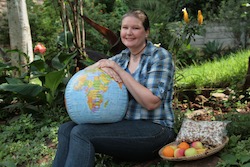
Former WDI MAP team member and WDI summer intern Patricia Griffin.
One student whose MAP experience changed her career path was Patricia Griffin, who was certain she would work for a U.S. automaker in a domestic car plant after getting her MBA. But she decided to join a WDI-sponsored MAP team headed by Clyde and that would work with a Uganda hospital.
Clyde remembers the team functioned without electricity for the first two weeks of its four-week stay. He said it was tough on the team but Griffin was energized by her experience and instead of heading to the auto plant now lives and works full time in Kenya.
“Questioning my assumptions and taking nothing for granted has become a basic mode of operation for how I conduct my career and life,” Griffin said of her time in Uganda. “That’s a direct result of the MAP experience.”
In a first for WDI, two managers visited Cuba last month to assess how the Institute could assist the country’s burgeoning entrepreneur community.

Amy Gillett, vice president of the Education Initiative, and Diana Paez-Cook, senior program manager of the Grants Management team, were part of a 20-person delegation that traveled to the island nation in May as part of a culture and policy trip organized by the travel company Insider Expeditions. Many on the trip were lawyers, policy development professionals, and lobbyists who hoped to learn more about Cuba’s economic transition.
That transition is slowly developing in the wake of renewed diplomatic ties between Cuba and the United States, and President Barack Obama’s historic trip to Havana in March. While it still operates a largely state-controlled economic system, the Cuban government has begun to make changes by permitting more of its citizens to operate private businesses.
WDI was founded in 1992 shortly after the collapse of communism in the Soviet Union as a way to help firms and organizations in formerly closed economies transition to a more free market economy. Cuba is viewed as the last of the Soviet bloc countries to transition to a more open economy.
Over the years, WDI has provided entrepreneurship training in Morocco, Rwanda, and Bahrain, and delivered business education training workshops to thousands of managers in former Soviet bloc countries.
Paez-Cook said the visit she and Gillett made to Cuba was invaluable because of the knowledge gained about the current situation on the ground and the connections made during the visit. She said the pair has a much better understanding of Cuba, which is “its own unique universe.”
While WDI typically works in partnership with local organizations to provide entrepreneurship training and other programs, the current system in Cuba has prevented the development of an organized civil society. A traditional approach of seeking out a partnership with an NGO will therefore not be viable at this time. Instead, Paez-Cook said WDI would need to cultivate relationships with individuals, educational institutions, and other entities to find ways to engage and support the transition.
Another factor on how open Cuba becomes is the outcome of the U.S. presidential elections. The next president will have the opportunity to build on the progress made by the Obama administration and work with the successor to current Cuban president Raul Castro, who plans to step down in 2018.
Paez-Cook said WDI will explore opportunities for engagement over the next few months.
“As economic and policy changes continue in Cuba in the medium- to long-term, entrepreneurship training and technical assistance could go a long way in providing Cuban entrepreneurs with tools and techniques to sustain successful businesses,” she said. “That said, any entrepreneurship program in Cuba would have to be uniquely tailored to the current context and conditions, and leverage the amazing creativity and resourcefulness of the Cuban people. It will be important to work in partnership with Cubans every step of the way to assist with their needs and learn from them as well.”
 Gillett said she was struck by the entrepreneurial spirit among Cubans, who are very interested in potential economic opportunities. She encountered a man who had a license from the Cuban government to operate a coconut water stand. Since resources are severely limited, the vendor works with what he can find, including the coconuts he harvests from nearby trees.
Gillett said she was struck by the entrepreneurial spirit among Cubans, who are very interested in potential economic opportunities. She encountered a man who had a license from the Cuban government to operate a coconut water stand. Since resources are severely limited, the vendor works with what he can find, including the coconuts he harvests from nearby trees.
“After meeting small-scale entrepreneurs and gaining a deeper understanding of the economic situation, we’re in a great position to start developing ways to help entrepreneurs move their businesses to the next level,” she said. “The resourcefulness and can-do spirit of the entrepreneurs we met was truly impressive. We saw many examples of business owners running creative businesses despite the lack of resources and raw materials available on the island.
“I believe that further access to materials and to business training would provide a huge lift to entrepreneurs in Cuba and a much needed stimulus to the Cuban economy.”
WDI faculty affiliate Matt Brown is scheduled to travel to Bahrain in May for the next phase of an entrepreneurship training program started in 2014 and designed by WDI in partnership with the Washington, D.C.-based Center for International Private Enterprise (CIPE) to not only increase the number of entrepreneurs in the country, but also give them the needed support to ensure their success.
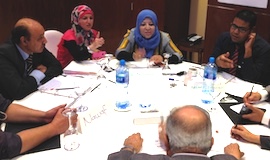
CIPE’s work in Bahrain, sponsored by the U.S. State Department’s Middle East Partnership Initiative (MEPI), has focused on the immediate need to improve the capabilities of trainers in the entrepreneurship program, and introduce elements of leadership, critical thinking and analysis, ethics and decision-making into the program’s curriculum.
It will be Brown’s second trip to Bahrain, an island nation in the Persian Gulf. His trip is a follow-up to his previous work there in March on how to mentor entrepreneurs.
WDI’s early work in Bahrain centered on entrepreneurship training. Bahrain had started several entrepreneurship initiatives in recent years unique to the region. However, these initiatives have gaps, including a lack of qualified entrepreneurship trainers to deliver the training programs.
To fill that gap, CIPE – which has worked in Bahrain to promote entrepreneurship – asked WDI to develop an entrepreneurship instructor’s manual and leadership curriculum to strengthen the delivery by trainers of Bahrain’s entrepreneurship initiatives.
The training materials incorporate leadership, critical thinking, active citizenship, ethics, and decision-making techniques into the existing curricula. It is used in the training of Bahrain’s trainers, and subsequently by the trainers in their entrepreneurship education programs. The materials incorporate leading practices applied to the unique Bahraini context, and was informed by input generated by a needs assessment survey and CIPE’s Bahraini stakeholders.
Julie Felker, a WDI faculty affiliate, wrote the leadership curriculum. She traveled to Bahrain in December 2014 to hold a workshop for trainers involved in Bahrain’s entrepreneurship initiatives and education programs to implement the training in conjunction with CIPE. Felker’s workshop included discussions on leading practices that were part of the newly developed materials and was tailored to address the needs of the Bahraini trainers.
In March 2015, Peter Scott, professor of entrepreneurship at the Whitman School of Management at Syracuse University and author of the 20-page entrepreneurial training guide, went to Bahrain. The guide provides skills, “how to” examples, and resources to teach entrepreneurship and make the process experiential, or real, for the student.
Bahrain has a reasonably developed entrepreneurship training ecosystem, Scott said. Several Bahraini universities have faculty dedicated to entrepreneurship, and they are excited and motivated to teach the subject. However, they do not have much considerable academic or practical experience on the subject.
Scott said WDI’s work in entrepreneur mentoring is a good complement to the earlier entrepreneurship training. Teaching entrepreneurship is only a small part of starting companies.
“At the specific entrepreneur level, company founders also need mentorship, funding and coaching advice,” he said.
Scott said the trainers he trained were very interested in learning more about design thinking, a human-centered approach to problem solving.
“Solving a big problem that a given group of people has is really the best way to start a company,” he said. “Even something as common as Facebook was started because the founder was trying to solve a problem he experienced.”
In May, Brown will meet with representatives from Tamkeen, a business incubator in Bahrain tasked with developing the country’s private sector. He will deliver a two-day “train the trainer” workshop for these representatives so they can mentor new and existing Bahraini entrepreneurs.
When Brown traveled to Bahrain in March, he brought along a comprehensive entrepreneur mentoring guide he developed to help Tamkeen officials create a program specifically for Bahrain entrepreneurs.
Entrepreneur mentoring is akin to advising an entrepreneur with the express purpose of elevating the mentee’s experience and success, Brown said.
“Having an entrepreneurship mentor is an essential asset to any developing enterprise,” he said. “Mentors can act as sentinels looking out at the horizon helping to identify potential threats and exploitable opportunities. Mentors can also serve as sanctuaries, a safe harbor where ideas can be openly shared and deeply explored.”
WDI’s entrepreneurship training, mentorship training and capacity-building work in Bahrain is one of the institute’s key focus areas, and builds on one of its areas of strength and expertise.
The Bahrain project builds on WDI’s long track record of providing entrepreneurship education in emerging markets. Working with Goldman Sachs’ 10,000 Women project, WDI designed and delivered 12, six-month entrepreneurship programs at the College of Business and Economics at the University of Rwanda in Kigali. In all, more than 300 women graduated from the program, which included modules on “Introduction to Business Strategies,” “Marketing, Negotiations & Customer Care,” “Operating a Business in Rwanda,” “Budgeting & Management Accounting,” “Financial Management & Loans” and “Developing a Successful Business Plan.”
And in 2004, the MEPI office awarded WDI a grant to provide training for entrepreneurs from throughout Morocco. The training consisted of sessions in marketing, strategy, accounting, finance and exporting. The grant was renewed the following year based on successful delivery. WDI partnered with Moroccan-based Al-Akhawayn University to offer a total of six training programs in Morocco.